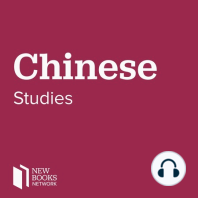75 min listen

Vivian Jing Zhan, "China's Contained Resource Curse: How Minerals Shape State Capital Labor Relations" (Cambridge UP, 2022)
Vivian Jing Zhan, "China's Contained Resource Curse: How Minerals Shape State Capital Labor Relations" (Cambridge UP, 2022)
ratings:
Length:
47 minutes
Released:
Jul 14, 2022
Format:
Podcast episode
Description
Contrary to intuition, many countries have found that having abundant natural resources such as petroleum or diamonds may be a curse as much as a blessing. Broad-based economic development may be stunted as resource extraction dominates the economy, and politics may be corrupted as different interest groups focus on controlling and redistributing resource rents instead of on governing well. In the worst cases, the fight for control over this wealth breaks into armed conflict. China is not usually considered in this light, since at the national level it has become a manufacturing powerhouse with natural resources only playing a minor economics role. However, the picture is different at the local level.
China's Contained Resource Curse: How Minerals Shape State Capital Labor Relations (Cambridge UP, 2022), by Jing Vivian Zhan, explores how mineral booms have affected business, the state, and ordinary people in China’s mineral-rich regions. Her book combines econometric analysis with an in-depth understanding developed over ten years of fieldwork and interviewing with key players.
Zhan finds that many of the classic resource-curse pathologies occur at the local level in China. Businesspeople collude with or pressure the government to gain mining rights and avoid close inspection of labor standards. Local people see little benefit from the economic development as few jobs are created and other forms of development are largely crowded out. If they benefit from any revenue windfalls it is in the form of short-term government handouts aimed to keep the peace, rather than long-term investments in healthcare, education, and other social services. Meanwhile, the central government in Beijing is only slowly putting together a national regulatory framework that might enable a more sustainable and equitable development path, and has limited capacity to ensure that its policies are carried out at the local level.
Vivian Zhan is an Associate Professor of the Department of Government and Public Administration at the Chinese University of Hong Kong. She received her BA in English and International Studies from Foreign Affairs College of China, and her PhD in political science from University of California, Los Angeles. Her research interests span comparative political economy, contemporary Chinese politics, and research methodology, with a focus on post-Mao reforms, intergovernmental relations and local governance. She is also interested in informal institutions and their impact on political and economic behaviours.
Host Peter Lorentzen is an Associate Professor in the Department of Economics at the University of San Francisco, where he leads a new Master's program in Applied Economics focused on the digital economy. His own research focus is the political economy of governance in China.
Learn more about your ad choices. Visit megaphone.fm/adchoices
Support our show by becoming a premium member! https://newbooksnetwork.supportingcast.fm/chinese-studies
China's Contained Resource Curse: How Minerals Shape State Capital Labor Relations (Cambridge UP, 2022), by Jing Vivian Zhan, explores how mineral booms have affected business, the state, and ordinary people in China’s mineral-rich regions. Her book combines econometric analysis with an in-depth understanding developed over ten years of fieldwork and interviewing with key players.
Zhan finds that many of the classic resource-curse pathologies occur at the local level in China. Businesspeople collude with or pressure the government to gain mining rights and avoid close inspection of labor standards. Local people see little benefit from the economic development as few jobs are created and other forms of development are largely crowded out. If they benefit from any revenue windfalls it is in the form of short-term government handouts aimed to keep the peace, rather than long-term investments in healthcare, education, and other social services. Meanwhile, the central government in Beijing is only slowly putting together a national regulatory framework that might enable a more sustainable and equitable development path, and has limited capacity to ensure that its policies are carried out at the local level.
Vivian Zhan is an Associate Professor of the Department of Government and Public Administration at the Chinese University of Hong Kong. She received her BA in English and International Studies from Foreign Affairs College of China, and her PhD in political science from University of California, Los Angeles. Her research interests span comparative political economy, contemporary Chinese politics, and research methodology, with a focus on post-Mao reforms, intergovernmental relations and local governance. She is also interested in informal institutions and their impact on political and economic behaviours.
Host Peter Lorentzen is an Associate Professor in the Department of Economics at the University of San Francisco, where he leads a new Master's program in Applied Economics focused on the digital economy. His own research focus is the political economy of governance in China.
Learn more about your ad choices. Visit megaphone.fm/adchoices
Support our show by becoming a premium member! https://newbooksnetwork.supportingcast.fm/chinese-studies
Released:
Jul 14, 2022
Format:
Podcast episode
Titles in the series (100)
Gene Cooper, “The Market and Temple Fairs of Rural China: Red Fire” (Routledge, 2013): Gene Cooper‘s new book is a multi-sited ethnographic study of market and temple fairs in the region of Jinhua, a city on the east coast of China and the home of Hengdian, “China’s Hollywood.” The Market and Temple Fairs of Rural China: Red Fire (Routle... by New Books in Chinese Studies